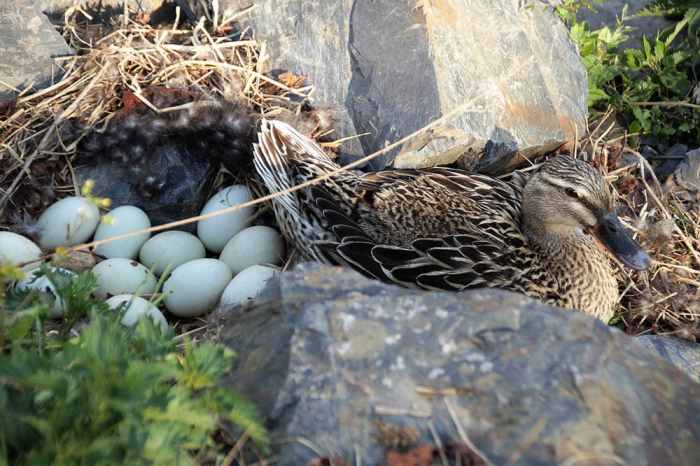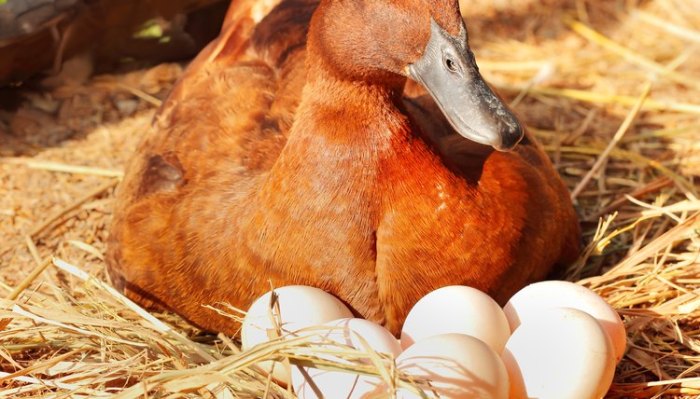Ducks lay eggs how often? This question sparks curiosity among poultry enthusiasts and home cooks alike. Join us as we delve into the fascinating world of duck egg-laying, exploring the intricacies of this natural process and its implications for both domestic and commercial settings.
From understanding the factors that influence egg-laying frequency to uncovering the unique characteristics of duck eggs, this comprehensive guide will provide you with a wealth of knowledge on this captivating topic.
Duck Egg-Laying Frequency
Ducks are prolific egg layers, with some breeds laying up to 300 eggs per year. The average number of eggs a duck lays per day varies depending on the breed, age, and season. Young ducks typically lay fewer eggs than older ducks, and egg production decreases during the winter months.
Factors Influencing Egg-Laying Frequency
- Breed:Different breeds of ducks have different egg-laying capabilities. For example, Khaki Campbell ducks are known for their high egg production, while Muscovy ducks lay fewer eggs.
- Age:Ducks reach their peak egg-laying capacity at around 8-12 months of age. Egg production gradually declines as ducks get older.
- Season:Ducks typically lay more eggs during the spring and summer months when daylight hours are longer. Egg production decreases during the fall and winter months.
- Nutrition:A balanced diet is essential for optimal egg production. Ducks that are not receiving adequate nutrition may lay fewer eggs.
- Stress:Stressful conditions, such as overcrowding or predators, can reduce egg production.
Egg-Laying Cycle: Ducks Lay Eggs How Often
The egg-laying cycle of a duck typically consists of four stages: laying, incubation, hatching, and brooding.
Laying, Ducks lay eggs how often

Ducks typically lay one egg every 24-36 hours. The egg-laying process takes about 20-30 minutes. Ducks usually lay their eggs in the morning, between 8:00 AM and 12:00 PM.
Incubation

After the eggs are laid, the duck will incubate them for 28-35 days. During this time, the duck will sit on the eggs to keep them warm and protected. The duck will also turn the eggs regularly to prevent them from sticking to the nest.
Hatching
Once the eggs have incubated for the full period, the ducklings will begin to hatch. The hatching process can take up to 24 hours. Once the ducklings have hatched, they will stay in the nest with the duck for a few days before they are ready to leave.
Brooding
After the ducklings have hatched, the duck will continue to brood them for several weeks. During this time, the duck will keep the ducklings warm and protected. The duck will also teach the ducklings how to feed and swim.
Egg-Laying Behavior
Ducks typically lay their eggs in a nest that they have built in a secluded area. The nest is usually made of straw, leaves, and other soft materials. Ducks will often lay their eggs in the same nest year after year.
Factors Affecting Egg-Laying Behavior
- Stress:Stressful conditions, such as overcrowding or predators, can cause ducks to stop laying eggs.
- Nutrition:A balanced diet is essential for optimal egg production. Ducks that are not receiving adequate nutrition may lay fewer eggs.
- Light:Ducks need at least 14 hours of daylight per day to lay eggs. During the winter months, when daylight hours are shorter, ducks may lay fewer eggs.
Egg Characteristics
Duck eggs are larger than chicken eggs, with an average weight of 2.5 ounces. They have a smooth, oval shape and a slightly greenish or bluish tint. Duck eggs are also richer in nutrients than chicken eggs, containing more protein, fat, and vitamins.
Nutritional Value and Culinary Uses
Duck eggs are a good source of protein, fat, and vitamins. They are also a good source of choline, which is important for brain development. Duck eggs can be used in a variety of culinary applications, including baking, frying, and poaching.
| Nutrient | Amount per 100g |
|---|---|
| Protein | 13g |
| Fat | 14g |
| Carbohydrates | 1g |
| Vitamin A | 570 IU |
| Vitamin D | 80 IU |
| Vitamin E | 1.5mg |
Egg Incubation

Duck eggs can be incubated naturally by the duck or artificially in an incubator. Artificial incubation is often used for large-scale duck egg production.
Optimal Conditions for Incubation
- Temperature:The optimal temperature for incubating duck eggs is 99.5°F (37.5°C).
- Humidity:The optimal humidity for incubating duck eggs is 55-60%.
- Duration:Duck eggs typically incubate for 28-35 days.
Egg Hatchability

The hatchability of duck eggs is affected by a number of factors, including egg quality, incubation conditions, and genetics.
Factors Affecting Egg Hatchability
- Egg quality:Eggs that are cracked, misshapen, or have thin shells are less likely to hatch.
- Incubation conditions:Eggs that are not incubated at the optimal temperature and humidity are less likely to hatch.
- Genetics:Some breeds of ducks have higher hatchability rates than others.
FAQ
How many eggs do ducks lay per day?
Ducks typically lay one egg per day, but this can vary depending on breed, age, and environmental factors.
What factors influence egg-laying frequency in ducks?
Factors such as breed, age, season, nutrition, and stress levels can all impact the frequency with which ducks lay eggs.
How long does it take for a duck egg to hatch?
Duck eggs typically take 28 days to hatch, with some variations depending on the breed and incubation conditions.
What are the nutritional benefits of duck eggs?
Duck eggs are a rich source of protein, vitamins, and minerals, making them a nutritious addition to any diet.
